#well not this kind of action
Text
Ignite snippet no one asked for? Why not.
Dueling practice below...
Lily turned around, and inhaled deeply. She held her breath and closed her eyes.
Silence stretched out behind her, and she could just make out the quiet padding of footsteps walking up behind her. She tensed her shoulders to brace for the impact as arms wrapped around her neck in a chokehold.
She wrapped her hands around the arms on her neck, trying to break the hold, but he was too strong for her. Instead, she took a few steps forward and dropped, falling to the floor out of his grasp.
Lily spun on her knee and popped up, wand in hand, and she cast a jelly legs jinx at him—Sirius, apparently—who began to wobble around the room. He tossed a stinging hex her way before collapsing on the floor. Lily put up a shield, disarmed Sirius, and turned to face James and Remus, where both advanced on her.
James and Remus both sent hexes her way, which she dodged by dropping to the floor and ducking them. While squatting and propelling herself to the side, she sent stunning spells toward both James and Remus, which they dodged.
They cast several spells at her, and a few well placed shield spells gave her the room to send offensive spells their way. Eventually, she tricked James into disarming him by making him think she was shooting the spell at Remus. She shot ropes at him, not even bothering to watch that they connected before she turned to face Remus.
She knew that he was holding back, not dueling to the top of his ability, but she also could tell that he wasn’t going easy on her. She was just about to hit him with a disabling jinx when she felt her legs seize together and her wand fall out of her immobile hand. Remus leapt forward and caught her just before her frozen body hit the floor.
“Alright, we’re done.”
Remus cast the reversal charm to free her, stilled Sirius’s legs, and released James from the ropes, then finally pulled her to standing. “You did really well, but do you know where you went wrong?”
She turned to face Sirius, who was still sitting on the floor, but now had his wand in his hands. “I should have done more than disarm him.”
Remus nodded. “If you had stunned him instead of using the jinx, he wouldn’t have been a threat anymore. Instead, he spent the entire time you were dueling us making his way to his wand. Which he got, at a pretty inopportune time. You were about to win.”
She let her eyes fall closed, sighing. She brushed back some loose strands of hair on the side of her head from where they had been tickling her ear. “Alright. Again?”
Remus shook his head. “I think we’re done today. We can do it again if you want later, but I think we’re all pretty worn out. Let’s head to lunch.”
Lily bent over, hands on her knees, in relief. She stood back up, brushing her hair out of her face in relief. “Thank Merlin. I’m so tired.”
#ignite#ignite snippet#ignite chapter 14#snitches get snippets#jily#james potter#lily evans#sirius black#remus lupin#action scenes are not my favorite to write#well not this kind of action#i prefer horizontal action#iykyk
25 notes
·
View notes
Text
So.
We went from this for Starclan Cats:
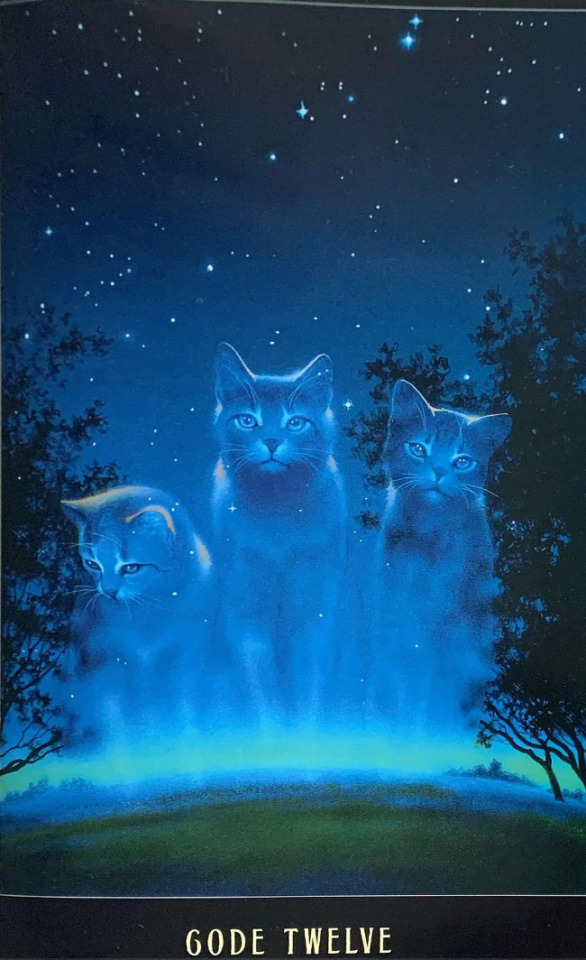
To.
This:


Biggest downgrade of my life.
#warriors#warrior cats#this is almost worse than the disney live action remakes to me#like. i used to stare and study wayne mcloughlin's art in the code of the clans book for ages before moving on to the actual story#it was so good and pretty#richardsons's...#i feel nothing except mild disappointment and concern for his well being from harpercollins#cuz uh.#what kind of time crunch does the wc team/divisionshave him /on/?????#like. the star patterns for reedwhisker are....okay and look like stars#but mistystar..... she looks like she got dunked in the lake first#or like she could be mistaken for ferncloud...cuz man....those are absolutely 100% not stars on her pelt#props to reedshisker for being the first cat in ??? book covers for having a different expression (even if it's a lil wonky) though#star's cover gets one point#a starless clan
1K notes
·
View notes
Text
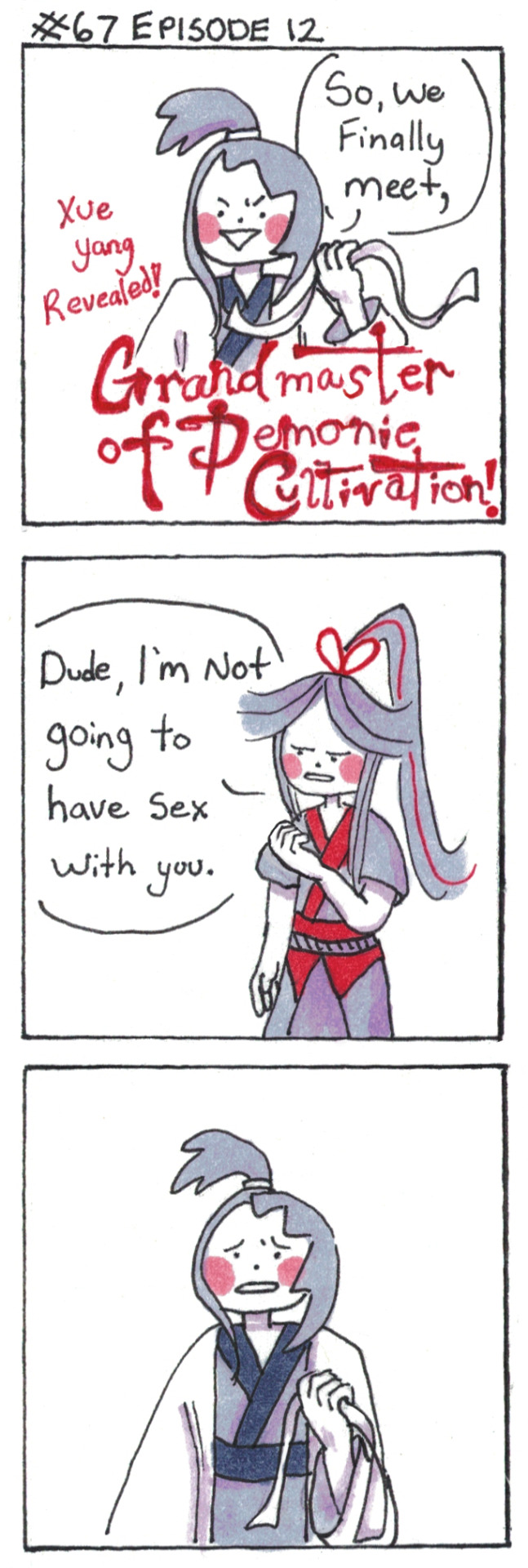
Why would you—That's not—I just wanted to ask for help, why did you have to go and make it awkward???
[First] Prev <–-> Next
#poorly drawn mdzs#mdzs#wei wuxian#xue yang#Its such a relief to not have to draw so many characters once again.#Redrawing the specific font from the English translated mdzs books was surprisingly fun!#Maybe I'm alone in this...but I think characters switching to a different font of speech for *emphasis* is peak comedy#you can't communicate voice changes of sound very well in non audio forms so this is the best I can do.#Anyways...rip Xue Yang. You finally meet your idol and he brushes you off#Rather— he doesn't live up to the expectations you built in your head#Kind of an on going issue there Jester (I refuse to call him king or sir)#XY is constantly making people out to be the versions he needed them to be to feel justified in his actions#but struggles to pivot when confronted with the fact that these ppl are *more* than just one surface reading!#wwx doesn't actually think xy is flirting. He's just tired of all the fake fans + wants to get out of this convo.#button mashing the A button to skip the unskippable cutscene#Lan Wangji is in the next comic btw. I've missed him dearly. I'm sorry he's been gone so long </3#edit: poorly spelt MDZS strikes again. This is why I need more time to write my comics. So I can actually proofread B*(#edit2: I cast 'Power of Technology' and fixed my error. Everyone reblog this version instead please
1K notes
·
View notes
Text
I think the key component to my personal reading of post-Delphi Pharma is that he's trying to be a horrible person on purpose. Not "on purpose" in the way that people have free will to exercise their own choices, but in that Pharma's "mad doctor" persona is a performance he puts on to deliberately embrace how much everyone else hates him. Basically, if people already think you're a "bad Autobot" and a horrible doctor who just kills his patients for fun, why try to prove otherwise to people who have already made up their minds about you? Just fully embrace the fact that people see you as an asshole. Don't try to change their minds. Don't plead for their forgiveness or understanding. Just stop caring. If you're going to be remembered as a monster, you might as well be a memorable monster, and eke as much pleasure and hedonism as you can out of it before karma catches up to you and you inevitably crash and burn.
I mean, I guess you could just go the route of "Oh, Pharma was always a fucked up creepy guy and Delphi was just him taking the mask off," but I really don't like that interpretation because, for one, it feels really wrong to take a character like Pharma becoming evil under duress and going, "Oh well clearly he did the things he did because he was evil all along," as if somehow Pharma breaking under blackmail/torture/threat of horrible death was a sign of him having poor moral character. As opposed to, you know, suffering under the very real threat of horrible death for himself and everyone he cares about while being manipulated by a guy who specializes in psychological torture.
The second reason is that it just doesn't make sense to write Pharma as having been evil all along. I mean...

Occam's Razor says that the best argument is the one with the simplest explanation. Doesn't it make way more sense to take Pharma's appearances in flashbacks, his friendship with Ratchet, his stunning medical accomplishments, and the few we see of him speaking kindly/sympathetically (or in the least charitable interpretation, at least professionally) towards his patients and conclude "This guy was just a normal person, if exceptionally talented." Taking all of these flashback appearances at face value and assuming Pharma was being genuine/honest is a way simpler and more logical explanation than trying to argue that Pharma for the past 4 million years was just faking being a good doctor/person. I mean, it's possible within the realm of headcanon, but the fact is Pharma's appearances in the story are so brief that there simply wasn't room in the story for there to be some sort of secret conspiracy/hidden manipulation behind why Pharma acted the way he did in the past.
I just can't help but look at things like Pharma's friendship with Ratchet (himself a good person and usually a fine judge of character) and the fact that even post-Delphi, pretty much every single mention of Pharma comes with some mention of "He was a good doctor for most of his life" or "He was making major headways in research [before he started killing patients]" which implies that even the Autobots themselves see Pharma's villainy as a recent turn in his life compared to how for "most of his life" he "used to be" a good doctor.
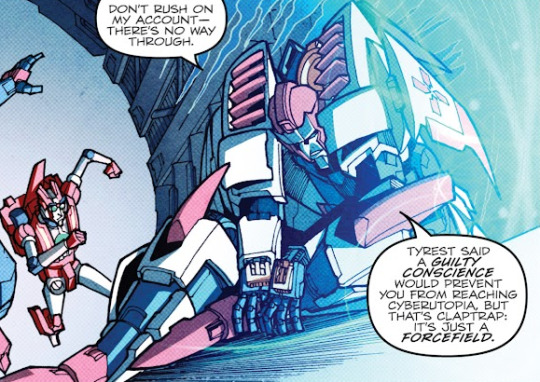
And although Pharma doesn't know this, we as the readers (and even other characters like Rung) know about Aequitas technology and the fact that it actually works, so... if Pharma really was an unrepentant murderer, why couldn't he get through the forcefield too? The Aequitas forcefield doesn't require that a person be completely morally pure and free of wrongdoing or else how could Tyrest get through, just that they feel a sense of inner peace and lack feelings of guilt. Pharma has murdered and tortured people by this point, and put on quite a campy and theatrical show of how much he sees it as a fun game, so why then can he not get through?
It circles back to my headcanon at the start of this post that the "mad doctor" persona is just that-- a persona. Delphi/post-Delphi Pharma's laughing madman personality is just so far removed from every flashback we saw of him and everything we can infer based on how other people see/saw him before that, to me, the mad doctor act is (at least in large part, if not fully) a persona that Pharma puts on to put his villainy in the forefront.
To avoid an overly simplistic/ableist take, I don't think Tarn tortured Pharma into turning crazy. To me, it's more like the constant pressure of death by horrific torture, the feeling of martyrdom as Pharma kept secret that he was the only one standing between Delphi and annihilation, the physical isolation of Messatine as well as the emotional separation from Ratchet, being forced to violate his medical oaths (pretty much the only thing Pharma's entire life has been about), etc. All of that combined traumatized Pharma to the point that the only way he could avoid cracking was to just stop caring about all of it. Because at least then, even if he's still murdering patients to save Delphi from a group of sadistic freaks, Pharma doesn't have to feel guilty and sick about doing it. As opposed to the alternatives, which were probably either going off the deep end and killing himself to escape, or confessing to what he did and getting jailed for it.
In that light, Pharma becoming a mad doctor makes sense. It avoids the bad writing tropes of "oh this character who was good his entire life was actually just evil and really good at hiding it" as well as "oh he got tortured and went crazy that's why he's so random and silly and killing people, he's crazy" and instead frames Pharma's evil as something he was forced into, to the point where in order to avoid a full psychological breakdown and keep defending Delphi, he just had to stop caring about the sanctity of life or about what other people might think of him.
Then, of course, the actual Delphi episode happens, and Pharma's own lifelong best friend Ratchet basically spits in his face and sees him as nothing more than a crazy murderer who went rogue from being a good Autobot. Then Pharma gets his hands cut off and left to die on Messatine. At that point, Pharma has not only been mentally/emotionally broken into losing his feelings of compassion, he's received the message loud and clear: He is alone. Everyone hates him. Not even his own best friend likes him any more. No one even cared enough about him to check if he actually died or not. He will only ever be remembered as a doctor who went insane and killed his patients.
So in the light of 1. Having all of your redeeming qualities be squeezed out of you one by one for the sake of survival and 2. Having your reputation and all of your positive relationships be destroyed and 3. People only know/care about you as "that doctor who became evil and killed his patients" rather than the millions of years of good service that came before.
What else is there to do but internalize the fact that you'll forever be seen as a monster and a freak, and embrace it? People already see you as a murderer for that blackmail deal you did, so why not become an actual murderer and just start killing people on a whim? People already see you as an irredeemable monster who puts a stain on the Autobot name, so why beg for their forgiveness when you could just shun them back? You've already become a murderer, a traitor, and a horrible doctor, so what's a few more evil acts added to the pile? It's not like anyone will ever forgive you or love you ever again.
Why care? Why try to hold on to your principles of compassion, kindness, medical ethics, when an entire lifetime of being a good person did nothing to save you from blackmail and then abandonment? Why put yourself through the emotional agony of feeling lonely, guilty, miserable, when you could just... stop caring, and not hurt any more?
#squiggposting#pharma apologism#i'm sure the doylist reason for the writing is just that pharma was a designated villain#so since he's a villain and 'crazy' it's fine for everyone even the good guys to treat him like complete trash#i just think from a watsonian perspective taking a sympathetic approach is way more interesting and logically consistent#what i mean is like. from a meta perspective one of the best ways to show that a character is super evil and not worth saving#is when even the good guy heroes. the ones who are supposed to be kind and compassionate and wise. see him as dirt#and this is also kind of a necessity in most plots bc TF is the kind of series that just needs action villains and long-term antagonists#so not every villain is written or has a plot to be made redeemable. and pharma is one of these bc he's not important or a legacy character#so from a doylist (meta) perspective you could read the autobots' disregard of pharma as a sign of#'this guy is not meant to have your sympathy as a reader. pay no attention to him'#but from a watsonian (in universe) perspective it paints a miserable picture of pharma being utterly forsaken by the ppl he served alongsid#and like yeah i'm super autistic about pharma so of course i view him with sympathy but like#the idea of being a loyal and good person for years only to be subjected to a Torment Nexus of#being blackmailed into breaking all of the oaths you held sacred. under threat of you and all your comrades dying horrible torturous deaths#then when your comrades find out about it they focus solely on the 'harvesting organs' and not on the 'blackmail' part#and then you get literally left for dead by your comrades and best friend hating your guts#and then you get rescued by a guy who uses you as a test subject for his evil machine#this is a fucking nightmare scenario like pharma could hardly be suffering more if the author TRIED to make him suffer#and for me it's like. the evil pharma did can't be decontextualized to what drove him to that. as well as the question of like#how easily ppl can write someone off as evil and turn a blind eye to (or even find satisfaction in) their suffering bc theyre evil#and either brought it on themselves or it's just karma paying a visit#like. i feel like if pharma WERE a shitty doctor and a terrible person his whole life then the delphi situation would feel like karma#but the way it's written and the lore retroactively put in makes it feel more pharma getting thrown in a torture carousel#and THEN becoming evil. but then being treated as if he was always evil or was some sort of bad apple#bc like i'm not opposed to LOLing when a villain gets a karmic torture/death related to the wrongs they committed#but in pharma's case it feels less like karma and more like endless torture + being abandoned by ppl who should have been more loyal
278 notes
·
View notes
Photo

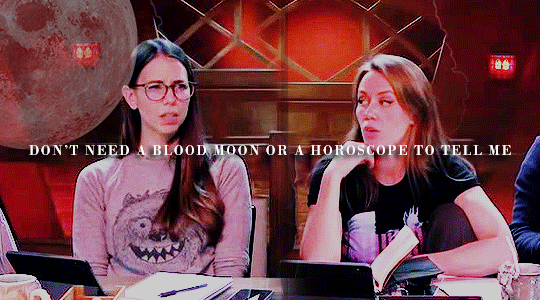
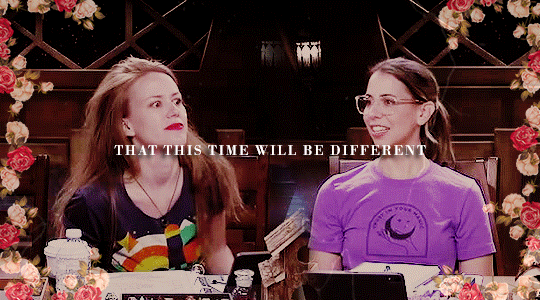
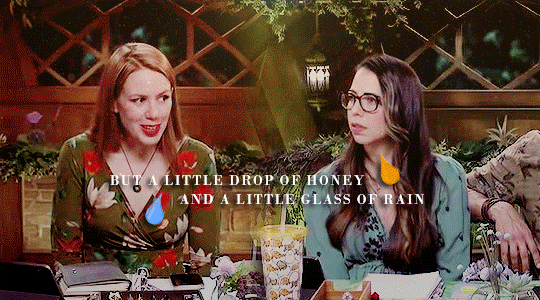

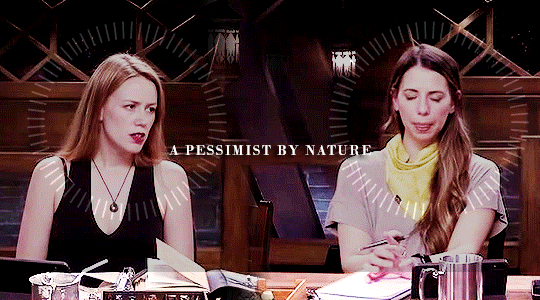
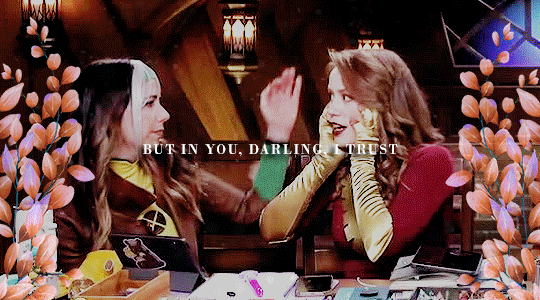
Sorry it’s strange that I’m crying, think it’s ‘cause you’re the one...
#critical role#bells hells#imodna#imogen temult#laudna#creations#literally i sank way too much time into this.#like i was like 'ooh that's a fun idea!'#well i can't just put the lyrics on their scenes it needs to be more interesting than that#what if i started overlaying relevant images#and putting textures#and then. it had been hours.#anyway if you like this kind of set let me know if i should be trying song lyric sets more for CR#this was more fun than i thought it would be or i wouldn't have sunk so much time into it#i had really not considered it because it's like. not a live action television show but i guess it can be done
1K notes
·
View notes
Text
House bailing Wilson out of prison as their first meeting is a fucking hilarious origin story. How'd you meet your best friend? Oh yeah he bailed me out of prison because he saw that I was getting divorced and pitied me
#The fact that House's first action to Wilson was one of random kindness is not lost on me#Well not completely random#But it was kind nonetheless#house md#gregory house#james wilson#hilson
358 notes
·
View notes
Text
The whole “cheats on test, creates the apocalypse” thing is such a disproportionate punishment, but it has to work, just, poor Danny Fenton in school, not even risking looking away from his paper for a second in case that somehow causes the school to blow up
#a person can develop ocd like that#when they start thinking the thought of something is just as bad as the action#and then they start to try and repress the thoughts by doing some kind action#except that makes it worse because now whenever they do that action it makes them think of that thought#anyways then the two become connected and you got ocd#didn’t explain it well because I haven’t slept in over 24 hours but y’all get what I mean#danny phantom#dp#danny fenton
475 notes
·
View notes
Text
not to beat the "sokka's misogyny" disk horse even further into the ground, but while i agree with the take that sokka being sexist logically doesn't make sense, i would go further to say that the water tribes themselves being sexist is both illogical and thematically contradictory.
the flaws of each nation in atla have always been linked to their element, and specifically what those elements represent. fire is the element of power; power, left unchecked, leads to imperialism and authoritarianism. earth is the element of substance and stability; stability, prioritized too highly, creates and justifies the rigid class system and rampant corruption of ba sing se. air is the element of freedom; freedom, taken too far, becomes irresponsibility and abandonment.
meanwhile, water is the element of change... therefore the water tribes cling to antiquated ideas about gender roles instead of adapting with the times (especially when the times involve a fucking war going on).
not only is this unrealistic, it also breaks the thematic pattern of the nations' flaws being virtues taken to extremes, and how this dovetails into the show's overall message about the importance of balance. if we're keeping with the pattern of virtue and vice being two sides of the same coin, then the flaw of the water tribes has to be related to change. and here is where some of the (badly executed) ideas in the comics and legend of korra could have come into play: change, left uncontrolled, can lead to progress... but at the cost of tradition and spirituality.
(imagine a nwt cut off from the world and forced to rely solely on itself, ingenuity and creativity flourishing out of sheer, desperate need. imagine a nwt where waterbending is nothing more than a tool, used to build and defend and maintain a fortress always at risk, its spiritual origins slowly lost to time. imagine a nwt more military than community, whose architecture and technology far exceed anything the world has ever seen, who look down upon their less advanced sister tribe, and see no need for the avatar - after all, where was he when they had no one but themselves for the last 100 years?
when warned that the fire nation is coming, they show no fear; they have held strong on their own for the last century, bolstered by their weapons and wits, and will continue to do so. you need the spirits, aang implores, and is met with derision, for there is no place for spirits in a society always chasing more, greater, better. the spirits have not helped us before, avatar. why would they now? we are all we need.
when the moon spirit falls, unprotected and forgotten in an abandoned, rundown spirit oasis - so do they.)
not only would this fit better thematically, it would also ensure that the nwt's flaw plays a role in its own downfall. where the fire nation's warmongering resulted in the poverty and suffering of its own people, and the earth kingdom's corruption led - at least in part - to the fall of ba sing se, the misogyny of the water tribes is never shown to negatively impact them in any way. the north isn't defeated by the fire nation because they relegated half the population to healing. the south doesn't suffer raids or lose their waterbenders because they (supposedly) didn't let women fight. this lack of narrative punishment means that - outside of a few girlboss moments for katara - the sexism of the nwt isn't significant to the overall story whatsoever.
furthermore, while the ba sing se arc last almosts half a season, and the fire nation's actions drive the entire show, this supposed systemic oppression of women shows up for one episode in the first season before disappearing entirely. pakku is reminded of his lost love, magically turns into a feminist, and somehow the entire tribe follows suit? no one else protests, not even the other students or the chief?
and yet, though there are still no female waterbenders other than katara, or agency for kanna in her relationship, or any indication that women stopped being forcibly betrothed - the entire issue is simply swept under the rug and never brought up ever again in the show. i understand this was a children's cartoon made in 2005, and that even having female characters openly speak about and challenge misogyny was a radical feat for the time and genre, but the reality of patriarchy is that it's structural, sustained and immensely difficult to resist - if the show was going to depict that resistance, it should have done so with greater depth and nuance, as it did for many of the other difficult topics it tackled.
ultimately, handwaving misogyny away like it never existed is far more disrespectful to katara's character, her fight against injustice, and the girls who saw themselves in her, than simply toning it down or removing it could ever be.
#atla critical#atla live action#it also always struck me as odd that sokka and katara seemed so chill with the north#when the nwt literally left the swt to fight the fire nation alone and stayed out of the war for a century#they lost their benders. their parents.#and all the while the north was sequestered away doing nothing to help#you're telling me that wouldn't have created any resentment? any anger?#plus imagine how powerful it would've been for the last southern waterbender to help the north rediscover the origins of waterbending#also the north disdaining spirits yet being saved by the ocean spirit and the avatar?#that's the exact kind of narrative irony atla does best#i'm seriously begging people to realize that the misogyny arc in atla was NOT as groundbreaking or well-developed as they think it is#and i for one am interested to see if and how netflix is going to handle it
131 notes
·
View notes
Note
i need to know when u watch episode 5 of gotchard, because it is by far the best episode of the season so far for a variety of reasons



toku really is just the absolute best
#kamen rider#gotchard#gif warning#tag team ACTION gif warning#(guy yelling at a trading card) GET OUT OF HERE CAN'T YOU SEE YOU'RE NOT WANTED#(heartbroken puppy voice) wr...wrestler g...#gotchard has had a bit of a rough start i admit but it does feel like it's getting better!#it does lend itself well to this kind of absolutely unhinged madness#i hope we cut back to the yakuza guys in like 20 episodes and they've opened up a butterfly reserve#hotaro with the utena references: i'm a gun now too#anyway this is rider so i'm ready for the reveal that rinne is spanner's sister or mom or time-traveling future daughter or whatever#lay it on me let's go
168 notes
·
View notes
Text
Opportunist may be our inner negotiator and can, in the right context, be great at talking us out of a pickle, but he also carries so so much of our neurodivergency by being so so tonedeaf in the worst possible situations. I love him.
#I just thought about how each of the voices would handle losing someone in the group#and all I could come up with for Opportunist was just loads of denial followed by a massive m e l t d o w n#Like of the divergent kind#It just made so much sense to me#And now I'm here just realizing why I could relate to his dumbass actions so well#Like obviously he was going to try sweet talking the unforgiving spirit breaking our leg#He hadn't caught onto the “unforgiving” part yet and tbh I wouldn't have either in his shoes#slay the princess#stp#voice of the opportunist
101 notes
·
View notes
Text
As someone who’s done bereavement care for almost 20 years, I’ve observed again and again and again that it is not staying with grief that cuts us off from other people, it’s suffocating grief and suppressing grief. It’s impossible to repress grief without also repressing all sorts of other things like joy and memory. Actually, expressing grief naturally connects us empathetically to other people. It is not an accident that right now when there is such a profound suppression of global grief, we’re also finding ourselves in a moment of such isolation.
Rabbi Elliot Kukla, in them magazine
I sought out this piece because Rabbi Kukla was quoted in today's sermon in reference to the ongoing genocide in Gaza ("It is lifesaving to mourn our humanity in inhumane times").
But this paragraph about grief hit me so hard I wanted to single it out to share. It is relevant to corporate grief of the sort we might experience when a state is doing harm in our name (police brutality, displacement, execution). It is also relevant to individual griefs.
In the bereavement calls I do for hospice, I have noticed, this is precisely what gets people stuck in grief: the feeling that there is no safe space and time to express grief. Companies tend to give very little accommodation for bereavement, if they give any at all. Culturally we're expected to get over losses in a matter of days. But grief rewires us, and some losses-- particularly losses like war, displacement, and police brutality where a state or institution does the same kind of harm repeatedly-- are complex and ongoing.
Grief impacts sleeping, eating, executive function. (I don't ask people in bereavement calls, "How are you doing?" I ask, "How are you sleeping?" "How's your appetite?" Maybe "Are there moments from your caregiving, or from your [loved one's] dying, that keep coming up for you?" Because of course you're not fine! You just lost someone essential to you. What I want to know is, is your body getting a chance to repair itself as your mind and heart process what you've experienced?)
People have talked to me after a loss about feeling exhausted and overwhelmed by daily life. It's not unlike recovering from a major injury and having a sizable portion of your bandwidth given over at all times to the tasks of bone, muscle, and nerve repair that are not under your conscious control. When tasks you're used to thinking of as having one part suddenly make it clear how complex they are? Cooking a meal takes more out of you. Doing a load of laundry takes more out of you. If you're already an introvert, the cost of social engagement goes up, at a time when social engagement might actually be very helpful.
Doing some of our grief work with other trusted people shares the load. It recovers some bandwidth. But many folks learn early in the grieving process that they have fewer trusted people than they thought. Or that it feels like the wrong time to deepen an acquaintanceship they'd hoped might become a friendship. Or that they aren't as comfortable asking loved ones for help as they thought they would be.
And the bereavement model I'm trained in assumes that a grieving person has experienced one recent loss. We know that a recent loss might poke us in the tender spots left by earlier losses. But that's still different from the experience of a tragedy that affects a whole community at once (as in an entire region's population losing multiple loved ones in a very short time and being forced to flee).
I don't really have a conclusion here, but I'm finding the activism that feels most healing and hope-filled to me has lament built into it: a chance to name the people who've died in our county's jail, while advocating for better communication with families of people inside. A chance to call out the names of people lost to covid while advocating for policies that will mitigate risk to vulnerable people.
Maybe it takes days to name all the people impacted by ongoing genocides in Congo, Palestine, Yemen, while urging our government to end its role in those genocides. Maybe our systems and structures, which aren't even good at honoring our grief for members of the nuclear family we're taught is our primary world, are disinclined to give us that time. Maybe we ought to take it anyway.
#this is not about my favorite silly little pirate show#except insofar as ofmd touches on grief / and actions to preserve the show acknowledge the grief we feel losing something meaningful#grief is the shape our love takes when we lose someone or something we love#and we should be able to name that person or thing#i'm never going to stop being mad at managers / well-meaning acquaintances who tell my clients 'it's been a while; you should move on'#seriously fuck all the way off with that; whoever hurt you / don't pass that hurt on#a person who is grieving is a person who has the capacity for love and care / and that capacity ought to be nurtured#because it's the basis of mutual aid / support / positive action / and a whole host of other things we need more of#anyway: strive to be a person who is safe to grieve around#and strive to be a person who is not too cool to care about anyone or anything#and if you wind up in any kind of position of influence or authority someday? make your environment more supportive to people in grief#grief care#community trauma
101 notes
·
View notes
Text
people genuinely believe all the stuff alastor said in "hell's greatest dad"?
#well.... apparently charlie does too.#girlie you have not bonded with this man. not even once.#either the writers forgot. SOMEHOW. or charlie is THIS desperate for any kind of fatherly-like affection.#i believe he was doing all this to-#1) gain charlie's trust#or#2) force lucifer into action. aka helping charlie by contacting heaven#the thought of alastor actually seeing charlie as a daughter is quite fun tho.
103 notes
·
View notes
Text
had a really interesting convo yesterday about ethics and whether intent or results matters (eg if you tried to make an ethical purchasing choice but the business was actually exploitative as hell, does that "count") and very much came to the conclusion that sure, if you're concerned with your personal immortal soul, as a christian might be, then intention counts. but if what you're focused on is your impact on the world, then intention means nothing if the actions have negative results, right? (that doesn't mean you're to blame for them! you didn't know! but you also don't get "ethics points" for trying, you know?)
and this also got me thinking about the whole christian idea that sinful thoughts are as bad as sinful actions because. they're just not imo. maybe for the sake of your Immortal Soul they are points against you, if that's your jam. but in terms of putting good into the world, in terms of your impact on other people, the ONLY thing that matters is what you choose to do with those thoughts. there is no way that "was kind to someone who was pissing me off, for the sake of community harmony" or "helped an acquaintance with a task even though I felt resentful about the time spent doing that" is a Bad Thing for the world
and it made me wonder how much purity culture and thought policing is rooted in (mostly evangelical) cultural christianity and this idea that ethical choices are an individual thing because what matters is the impact of them on YOUR soul and not, you know, things we do because of what we owe the world around us / because of love for others / because a world where people are trying to put good into it is a hell of a lot nicer to live in than one where people are only worried about themselves
i grew up evangelical but like. fairly mild evangelical and even though there wasn't a big focus on hell and stuff, i definitely fixated on imperfect thoughts and behaviours that were putting absolutely no harm into the world, rather than focusing on what i could do to put good into it, and that individualistic vs outward-focused approach to morality has been something i've grappled with a lot as an adult. but i never really thought about it as simply as this and really that's what it boils down to. are you making the ethical choice because you're trying to put good in the world, or because it would make you a "good person" to do so? because the answer to that 100% defines whether it's the thought or the result that counts
#also i feel like Sinful Thoughts Are As Bad As Sinful Actions...#as well as being bullshit...#is just like a one way trip to moral ocd and a whole lot of guilt spirals#and i just don't think it's useful! you can't necessarily choose your thoughts!#you can however choose your actions because Good is something you do not something you are#ethics#i do think The Good Place did more to make me interrogate my evangelical upbringing and ethical assumptions than anything else#but also this idea of putting good into the world... idk. it's kind of encouraging AND scary#i don't think I'm naturally a very good person but i can choose to do good#i can be bitter and jealous and resentful and still help people and make their lives a little easier#and my feelings are not actually impacting on the world whereas my actions are#at the same time in a society built on exploitation and corporate greeed#it's hard not to be conscious of the harm my actions are doing without me trying#i didn't necessarily make an unethical choice but all of my choices cause harm to someone somewhere#living in the west and the global north and whatever you become very conscious of that
196 notes
·
View notes
Text
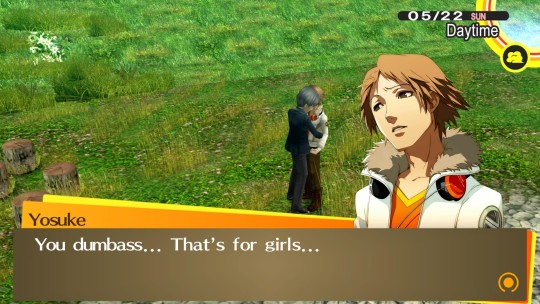
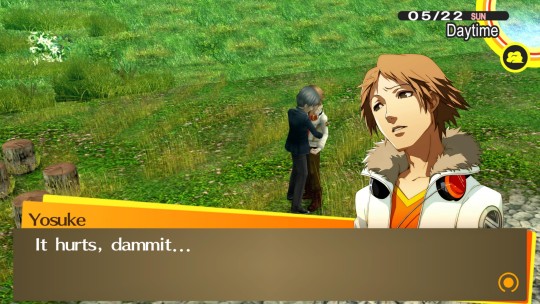
#p4#persona 4#p4g#persona 4 golden#hanamura yosuke#yosuke hanamura#god do i have so much to talk about in this scene#first of all yu's hug kills me because thats a very intimate hug thats not a bro hug where you put your arm around their shoulders#thats a hug where he put his arms around yosuke's waist!!!!#when yosuke says that's for girls... i kind of see what he means? personally id only hug my romantic partner the same way but hey#second of all and more seriously i think this is a really good example of how Yosuke's words frequently fail to match up against his action#yosuke might complain about how the hug is for girls but it doesnt stop him from holding on#the scene fades to black and yu says they stayed on the riverbank until yosuke calmed down#so they mught as well have hugged for the whole time?#idk im personally obsessed with the contradictions between what yosuke says and what he does because expressing himself is not his strength#Yosuke's words cannot be reliably taken at face value but i think his friends - and yu especially - come to learn and accept that abt him
141 notes
·
View notes
Text
Replaying from the beginning, I don't think I'll ever get over the fact that Astarion actually expected us to not immediately clock that he's a vampire. And I know this has been said before, but it's so hilarious.
He's over there, thinking himself suave and secretive, with such decor as...
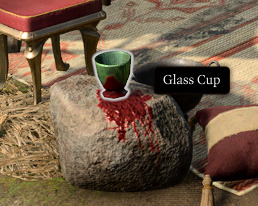
A clearly bloody glass cup sitting right in front of his tent, in a puddle of blood, as the very first thing you see
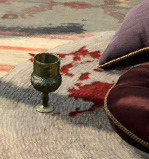
another bloody goblet at his feet, with stains that do not look anything like wine on his white carpet
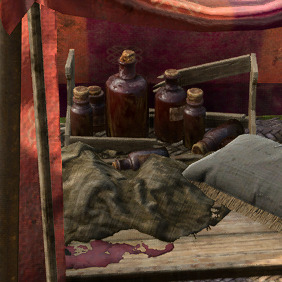
jars of blood inside his open tent, complete with a very clear bloodstain on the pallet under his bedroll
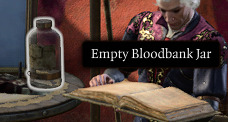
this clearly labeled bloodbank jar, covered in bloodstains, just on the table right next to him
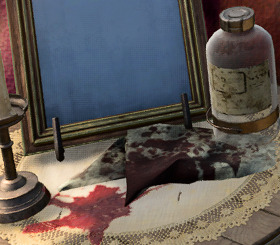
this veritable dinner table napkin covered in blood, and of course, the pièce de résistance,
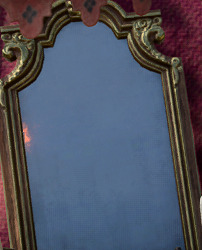
the fucking mirror in clear view, angled perfectly so that if he wasn't a vampire, you should be able to see his ass in it in premier plan when approaching from the campfire.
Not only is he very clearly a vampire, but he's also an excessively messy eater, which honestly makes the fact that he is only revealed on the third night a downright humiliating admonishment of the party's collective intelligence.
(Though, armed with the knowledge that he cannot seem to keep blood in his mouth, there is also some real potential here for the first act of physical tenderness he experiences in centuries to be the player character just... absently wiping a drop of their blood off his chin with their hand after a feeding.)
#not the first feeding of course but like the third maybe#i think i'll headcanon that iona did that#just an unconscious action; a very simple and natural expression of care#he jerks back ofc like she slapped him#like he had just lifted off her and they're both still slightly dazed#they're looking at each other for a moment from like... three inches away still; catching their respective breaths#and she just said “here; let me just--” and... did it. without thinking#and it's weirdly intimate and kind of awkward the next day but they both decide to not mention it#baldur's gate 3#squirrel plays bg3#(yes I know Astarion doesn't need to breathe and I've said so before)#(but I still have decided that I like to think “faking” it comes as naturally as... well as breathing should)#(I do think he is prone to temporarily forgetting to breathe in emotionally charged moments though)#oc: iona raedir
145 notes
·
View notes
Text
going through the wiki transcripts and finding out clem and vi support each other even more than i already thought......... god.....

#the reassurances and support................... killing me........#thought the 'this is marlons fault' option was gonna be mean to marlon but its clem reassuring vi that what happened wasnt her fault??#and that vi couldnt have known marlon was lying to her??#vi being kind and understanding about clem holding up tenn and tries to soften the tension between them#RAAAAAAHHH#it speaks#twdg#violentine#had to start a new save to see some of these choices ive never picked In Action and its great so far thank you wiki#having a real [GLASS HIM] moment right now about some of these like wow i did Not think that was what that option meant#new [GLASS HIM] moment: telling vi 'sorry to disappoint' is SARCASTIC??? 'no disappointment here im glad you came back :)'#and clem smiles and 'hah's about it 😭 theyre so cute new fave option there#'what about the others?' 'ohhh well theyre less excited about it'#end of the ep said vi was annoyed by the sarcastic greeting which is very interesting since they were both smiling about it#see what i mean i thought it was gonna be mean sarcastic but it comes off as playful sarcastic but its apparently mean sarcastic
71 notes
·
View notes